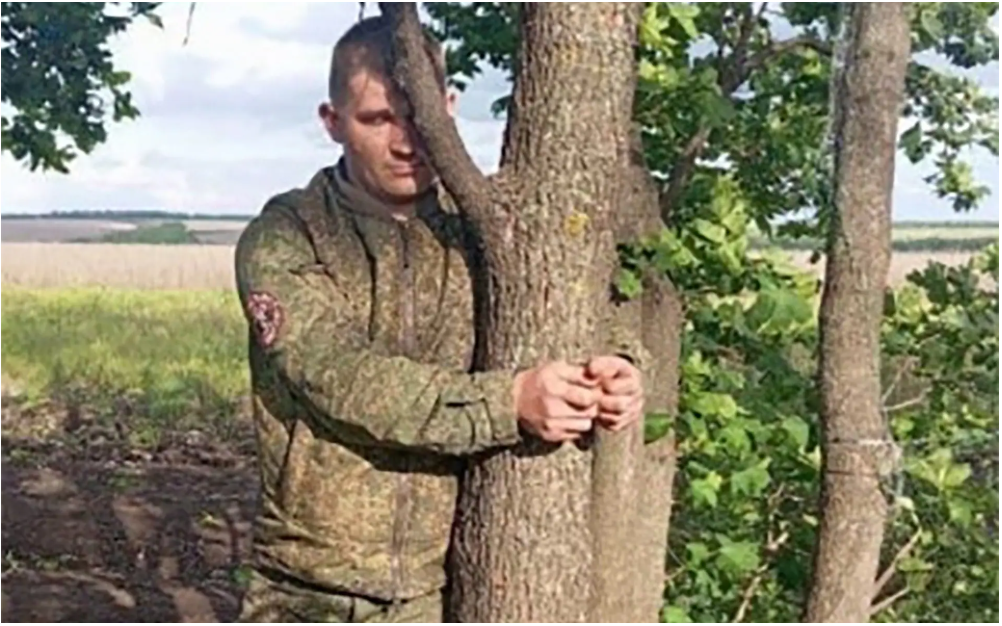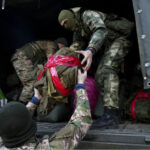Moscow increasingly relying on vulnerable recruits in Ukraine – regardless of the human cost
A wounded man lies in a muddy ditch, stripped of his uniform and too weak to stand. His ribs protrude beneath the chain of his dog tags, the only trace of the soldier he once was. He murmurs incoherently, clearly too mentally incapacitated to communicate or move.
The man in the video is one of several mentally disabled men reportedly sent to the front line by Russia, The Telegraph has been told.
Ukrainian officials say it is a strategy that reflects Moscow’s growing reliance on vulnerable recruits and its willingness to deploy an almost limitless supply of manpower to make gains on the front lines, regardless of the human cost.
Sources inside the military have shared research with The Telegraph detailing five cases that they say expose how Russia is willing to send soldiers who are disabled or suffering from disease to the front line.
“Russia will never run out of people,” said Anna, a member of Ukraine’s defence forces with close ties to the security services.
“This means if sacrificing one man per 10 metres advances them and puts pressure on us, [they will do it]; it is an effective tactic in a society where there is no price to pay for sacrificing the poor,” added Anna, whose name has been changed because of security concerns.
The video of the incapacitated man is not a lone case, but part of a troubling pattern emerging in Russia’s forces, according to Dmytro Zhmailo, a military-political expert and executive director of the Ukrainian Security and Cooperation Centre (USCC).
“Such cases are not isolated and are quite systematic,” Mr Zhmailo told The Telegraph.
“Due to the need for manpower, against the backdrop of high losses in the army, Russia is forced to recruit citizens regardless of their health or physical disabilities.”
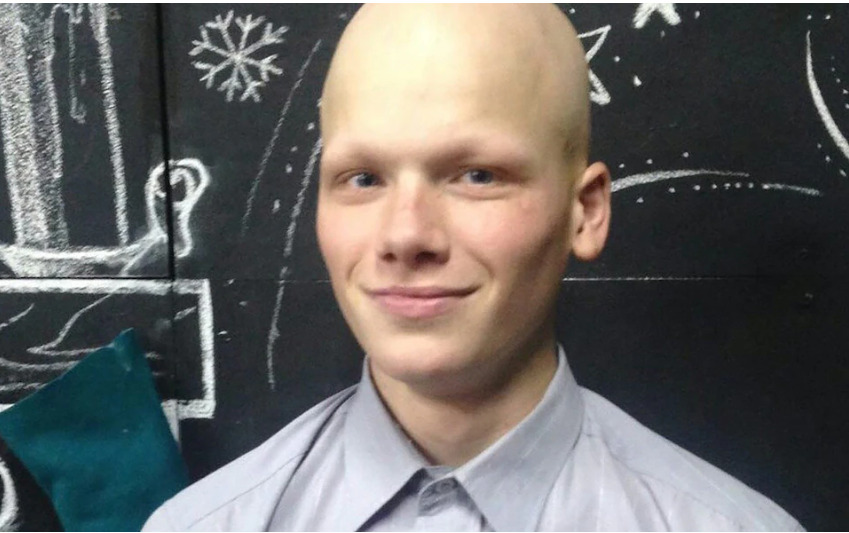
Pressured into combat
A Ukrainian commander, who spoke on the condition of anonymity, told The Telegraph that senior officials were aware of at least two cases of mentally disabled Russians being sent to the front line, in addition to two detailed by the USCC and the one purportedly shown in the video.
Semyon Karmanov was one of them. The 27-year-old had been unable to read or write and was diagnosed in childhood with an “intellectual disability with significant behavioural disorders requiring care and treatment”, according to the commander.
Even with this lifelong condition, a prison medical commission classified him as “Category A”, deeming him fit for military service.
Karmanov was flown from prison to a training camp in occupied Luhansk and issued with a military ID listing him as a “driver” – even though, according to his mother, he could not drive.
He was killed on the front line this autumn after suffering a head wound.
The commander added that earlier this year, a 22-year-old from western Russia with an intellectual disability was pressured by police into signing a military contract, even though a medical certificate had declared him unfit for service.
Alexey Vachrushev spent much of his life under psychiatric care and was educated at a specialised school for children with developmental disabilities.
But Vachrushev was sent into front-line combat after attempting to flee his post, and his current whereabouts remain unknown.
Numerous videos circulating on social media appear to show other captured Russian soldiers who are unable to communicate or understand where they are – further evidence, Ukrainian officials say, of Moscow’s reliance on the unfit and unwilling.
“This includes both prisoners from Russian prisons who have disability groups due to chronic diseases, and Russian civilians who, despite having health problems, agree to sign a contract with the Russian Ministry of Defence, often under pressure,” said Mr Zhmailo.
He described another case, involving a soldier named Artyom Radaev, also 22, who had been disabled since childhood but was nonetheless sent to the front by the 4th Separate Motor Rifle Brigade.
Days later, he disappeared near Horlivka.
His mother, Galina, later recognised him in a photograph of Russian soldiers tied to trees as punishment for refusing to fight.
Despite repeated appeals to military authorities, she has received no information about his fate.
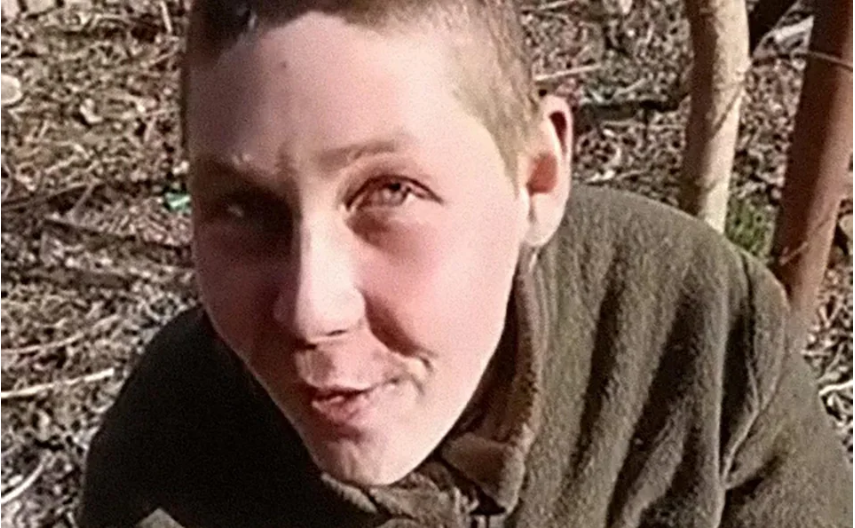
‘Recruits arrive and then they’re dead’
Volkov Oleg Vladimirovich, 23, was also diagnosed with a psychiatric disability as a child, but was forced to sign a military contract after being caught stealing a crate of wine.
Mr Zhmailo said that on Vladimirovich’s first day in Ukraine, he panicked and hid in an electrical transformer cabin, where he was captured.
His whereabouts remain unknown.
In further evidence of Russia’s costly tactics, a soldier fighting in Chasiv Yar said this week that newly mobilised recruits sent to the front often die almost immediately, with his own unit suffering over 90 per cent losses.
“They recruit people who don’t know anything – millions are spent on [recruiting] them. They arrive and immediately, they are 200s [dead],” the man, identified as Ruslan of the 88th Reconnaissance and Sabotage Brigade “Espanyola”, said on a video shared on social media.
“There are six of us left: there were seventy, now there are six,” he added. “You drive over corpses – there’s no other way.
“It’s like that, you just can’t tell who you’re driving over… We’ve got three brigades buried under slabs.”
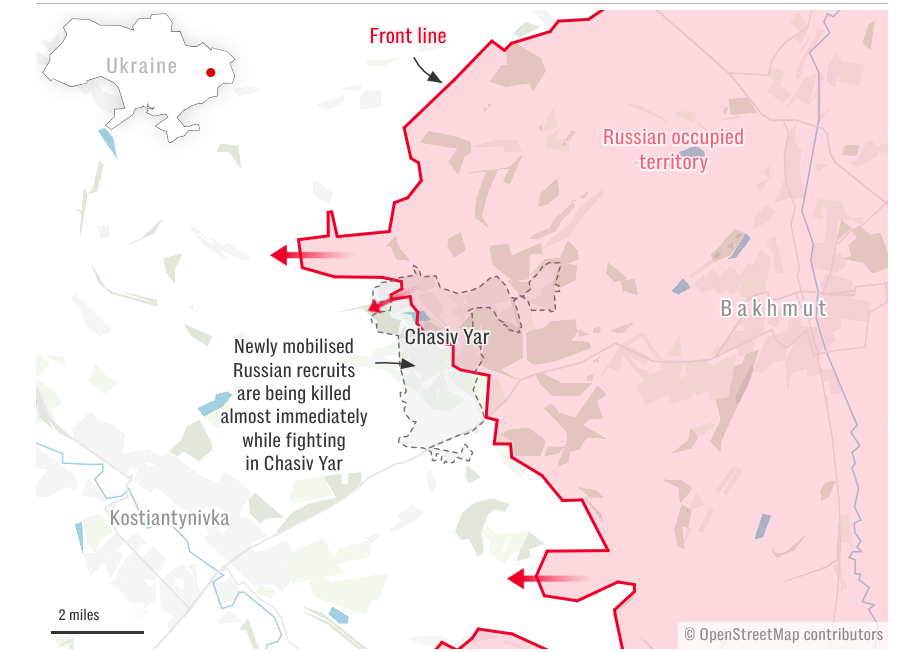
Data from Ukraine’s general staff, supported by reports from the Institute for the Study of War, corroborates the high Russian losses in the city in the Bakhmut region, estimating around 210,000 casualties during the summer offensive, with only minimal territorial gains.
But Anna, The Telegraph’s contact in the military, said: “We cannot claim that the equation of X Russian casualties equals them winning or losing because while every soldier is a life to us, for Putin every soldier is simply a means to an end, of which he has a never-ending supply.
“They are more upset to be sanctioned by the United States than to lose 500,000 men.”
She added: “People look at casualty numbers and think they equate to us winning – we are not losing – but they [Russia] keep gaining and pushing… This is happening in Bakhmut, Chasiv Yar, Pokrovsk, Avdiivka.”

Kremlin ‘doesn’t view infantry as humans’
Anna said the war was no longer one of skill but of manpower, adding that although Ukraine had the edge in some aspects, Russia’s sheer numbers and willingness to send waves of men into battle were hitting hard.
“We are better skilled if you equate our average guy to theirs. We have slightly better tech; they have much better production. The difference is the unrelenting waves of help.
“Every soldier is a tool to either acquire land or die trying, all the better if they take us with them. The partners and public must realize that the Kremlin doesn’t view its infantry as humans but chattels.”
Colonel Oleksandr Zavtonov of Ukraine’s 30th Marine Corps, serving in the Kherson direction, told The Telegraph that his soldiers were in a similar predicament.
“Attacks are happening constantly, day after day. Month after month,” he said. “In radio intercepts, it is not uncommon to hear the occupiers refusing to go on the assault.
“However, judging by the situation that has developed, the Russian commanders are indifferent to this.”
Colonel Zavtonov said that, although the attacks were often not large-scale, their continuity and number were aimed at exhausting Ukrainian forces.
“We see that the enemy has no limits in the cost of human lives, which to the civilised world looks like cannibalistic tactics,” he said.
“For the Russians, this is the norm – they always fight like this, without valuing human life.”
By VERITY BOWMAN/The Telegraph

